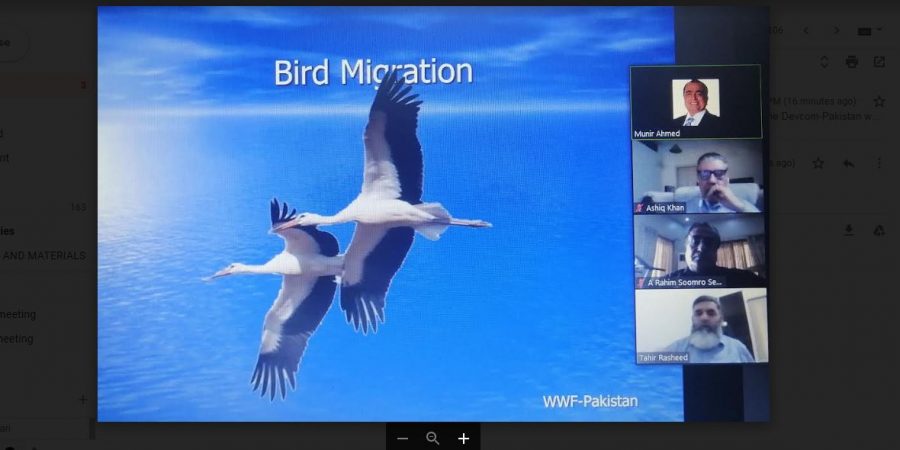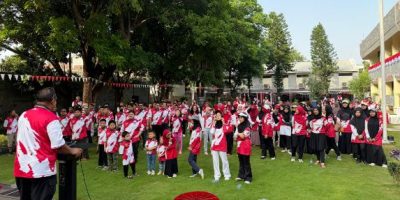Experts urge provincial govts to take measure to protect ‘guest birds’

ISLAMABAD, OCT 10 (DNA) – The experts have urged the federal government to avoid construction projects in the two islands Bundaal and Bundu that are habitats of the local biodiversity and the habitats of the migratory birds too. Under the Ramsar Convention and Convention on Biological Diversity and many other international and multilateral treaties signed by the Pakistan government, we need to fulfil our national and international commitments that are more important for us as a nation than obliging a few influential elites.
Speaking at a webinar on “Migratory Birds: where we stand now”, the experts urged the provincial governments to take necessary measures to protect the ‘guest birds’ from overhunting, ensuring safe flying through Pakistan and resting on the lakes and ponds.
The webinar was organized by the Development Communications Network (Devcom-Pakistan) on Saturday to mark the World Migratory Bird Day that falls on October 10. The experts included EV-K2 CNR Scientific Representative on Biosphere and Climate Change Ashiq ahmed Khan, IUCN Pakistan Country Head Mahmood Akhtar Cheema, WWF Pakistan Director Sindh and Balochistan Programme Dr Tahir Rasheed, Secretary Agriculture and Wildlife (Sindh) Abdul Rahim Soomro, Biodiversity and Habitat expert and former staff of the Ministry of Climate Change Umeed Khalid, Project Manager Biodiversity (Gilgit-Baltistan) IUCN Pakistan Saeed Abbas, Cholistan Institute of Desert Development Shazia Anjum and Prof Saleem Azam, a longtime hunter. The webinar was hosted and conducted by Devcom-Pakistan and DTN Executive Director Munir Ahmed.
Ashiq Ahmed Khan, Ev-K2-CNR Scientific Representative on Biospheres and Climate Change, said the migratory birds connect the world in one ecological order. But 60 percent of them lose their life on the journey to several hazards including storms, hunting, collisions with man-made objects such as wind turbines, and starvation. The risk of starvation is increased when stopover sites are lost through climate change or loss of habitat to development or agriculture.
In Pakistan, he said, they face massive licensed overhunting while their habitats have been destroyed due to criminal negligence by the authorities. All the Ramsar sites are in the worst condition despite Pakistan having signed all the international treaties very eagerly. Unfortunately we see no action accordingly. After devolution it is the responsibility of the provinces but they lack capacity and political will.
Mahmood Aktar Cheema said rapid population growth and ill-planned change in the land-use are the core challenges for Pakistan that has created most of the critical issues facing the nation. We handle the issue of migratory birds despite all policy frameworks available.
We need a 10-year integrated sustainable development plan starting off from 2021 while preparing ourselves for the Convention on Biological Diversity (CBD) next year. He said the federal government should have a fresh look on the National Policy on Wetlands pending for the last eight years.
Tahir Rasheed said we have no source to collect data on the migratory birds though we are one the eight most important routes for the migratory birds.
A huge percentage of the migratory birds lose their lives to overhunting and lack of habitats in Pakistan. The migratory birds help in ecosystem balance by eating up the crops’ enemy insects. Many influential people have developed their own ponds and lakes with toy-ducks to attract the guest birds for their illegal hunting. Unfortunately the district management and local authorities play blind on these criminal activities.
Devcom-Pakistan Executive Director Munir Ahmed said devolution of the environment after the 18th Amendment in the Constitution has played havoc to all the social sectors including environment, habitats and community health. Provincial governments need to take care of their mandate and responsibilities by allocating sufficient resources and investing in the capacity of districts to face the challenges of sustainable development and environment.
Federal government shall take inclusive and participatory measures to fulfil its national and international obligations for the best environmental, economic interests and community health.
Sindh Secretary Wildlife Abdul Halim Soomro said that the Sindh government has taken several steps for the protection of lakes, habitats, biodiversity and wildlife.
Hale Je Lake has been rehabilitated while work is in progress on other lakes too. Restoration of habitats for biodiversity is also in progress besides planting a million saplings and initiating urban forestation.=DNA
====================
Related News

Indonesian embassy kicks off Independence Day celebrations
ISLAMABAD, AUG 10: /DNA/ – The Indonesian nationals and their families gathered at the EmbassyRead More

PTI’s Zartaj Gul, Ejaz Chaudhry appeal to LHC against ATC convictions in May 9 riots cases
ISLAMABAD, AUG 9: PTI leaders Zartaj Gul and Ejaz Chaudhry filed appeals in the LahoreRead More


Comments are Closed